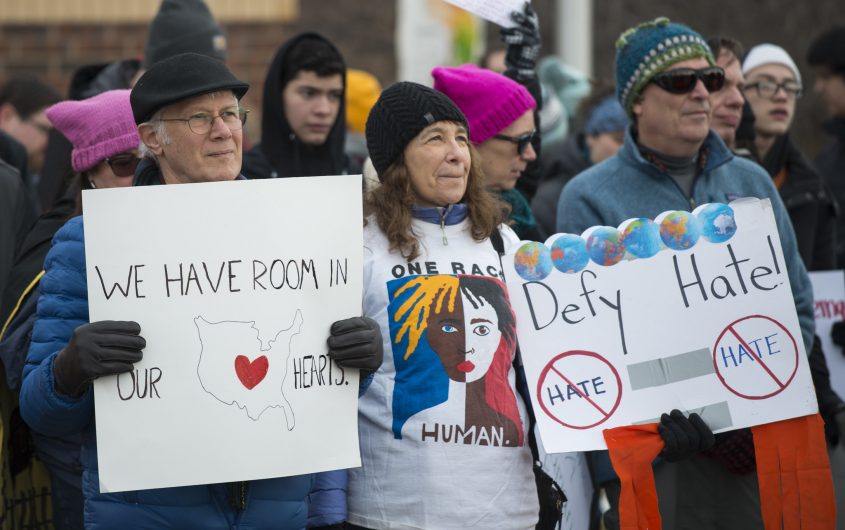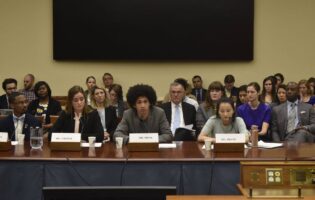
Fibonacci Blue via Flickr
Lost in Translation: The Meaning of Sanctuary for Immigrants in the U.S. and Germany

Beverly Crawford Ames
University of California at Berkeley
Beverly Crawford Ames was a DAAD/AICGS Research Fellow in mid April - mid June 2019. She is Professor emerita of Political Science and Political Economy at the University of California at Berkeley and is the former Director of Berkeley’s Center for German and European Studies. She has written on German foreign policy, ethnic and religious conflict, international trade and security, the European Union, globalization, regionalism, and topics in international relations theory. In 2015 she received fellowships from the Turkish National Science Foundation and from the European Commission to study the demographics of the refugee crisis in Turkey and Europe, and became an “accidental volunteer” aiding Syrian refugees on the streets of Izmir. In 2016 she was a Senior Fellow at the Hertie School of Governance in Berlin where she worked on a project on refugee integration in Germany for BAMF, the German Federal Office for Migration and Refugees. In 2017 she taught a course on the Global Refugee Crisis at the University of Haifa. Her most recent publications are "Merkel III: From Committed Pragmatist to ‘Conviction Leader’?" with Ludger Helms and Femke Van Esch, German Politics, Vol. 27, Issue 3, 2018; "The Euro, The Gold Standard, and German Power: A Cautionary Tale," with Armon Rezai, German Politics and Society, Issue 125 Vol. 35, No. 4 (Winter 2017): 77–104; and "Moral Leadership or Moral Hazard? Germany's Response to the Refugee Crisis and its Impact on European Solidarity” forthcoming in Crisis, Resilience and the Future of the EU (working title - editors Akasemi Newsome, Marianne Riddervold, Jarle Trondal), Palgrave Macmillian, 2019.
During her fellowship at AICGS, Dr. Crawford Ames will examine the representation of migrants and the role of misinformation, exaggeration, distortion of facts, and fabricated content about them in both social and mainstream media as important factors explaining the rise of right-wing extremism in both Germany and the United States.
Issue Brief 61
The American concept of “sanctuary cities” for asylum seekers is foreign—and somewhat incomprehensible—to Germans. In the United States, “sanctuary jurisdictions” are relatively few, and they are established to protect immigrants from what they see as inhumane immigration policies of the federal government. It has long been a crime to enter the U.S. between ports of entry without a visa or other documentation, but enforcement waxed and waned and penalties for a first apprehension were relatively mild.
The Trump administration, however, used the law on the books to separate families at the border and began to round up those undocumented people throughout the country. As immigration rulings became harsher, even before the Trump administration, sanctuary jurisdictions sprang up to assert their right to protect those without documents from federal agents who would apprehend, jail, and deport them. In stark contrast, it is not a crime to enter Germany between ports of entry, and every city is an asylum seeker’s sanctuary, mandated and aided by the government to provide refuge.
The current German position is to offer sanctuary to all those seeking asylum, regardless of how they enter the country. The gap between the German and American positions is wide, but it may be narrowing with the rise of the anti-immigrant far right in Germany. There are very few “undocumented” immigrants in Germany, and detention of those ordered to be deported is rare. Indeed, the German asylum process provides for documentation, aid, and freedom of movement at every stage, even for rejected asylum seekers slated for deportation.
In some ways, Germany has the luxury to develop a more humanitarian approach to asylum; unlike in the United States, whose border with Mexico has made millions of illegal crossings possible, Germany is not a frontline state for immigrants to enter. Rather, the EU provides border protection on its perimeters, and asylum seekers must apply for asylum in the first member state they enter. It is therefore difficult—but not impossible—to cross the border and live in Germany illegally. There, even rejected asylum seekers are documented: they generally appeal this decision and often receive a status of “Duldung” or “toleration” during their appeal process. Although their stay is considered “unlawful,” they are not punished for continuing to live in Germany. If they do not cooperate with federal authorities, their welfare benefits are reduced, but they are rarely detained. Threatened with immediate deportation, they can seek church sanctuary.








